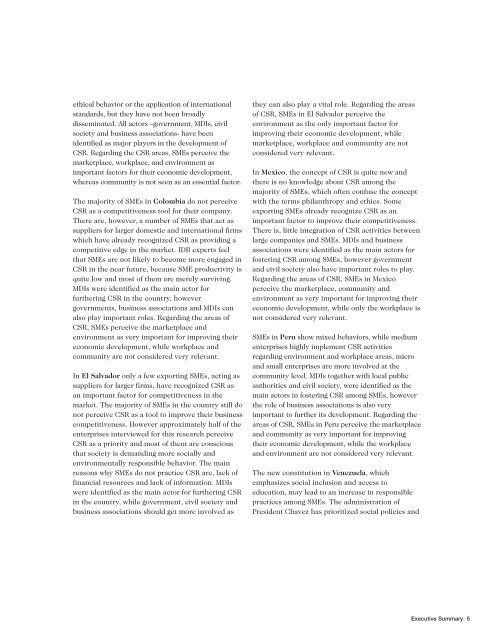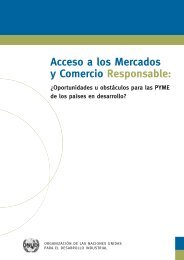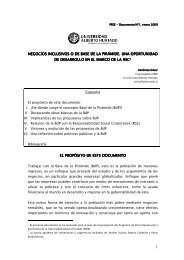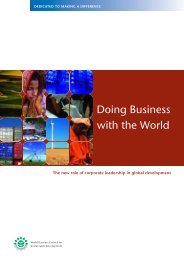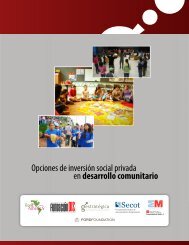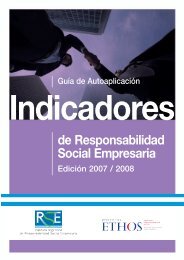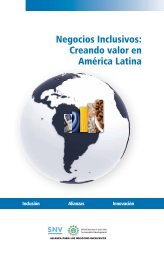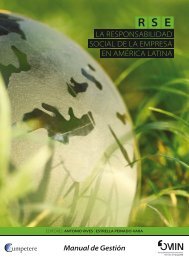strong internal relationship, in o<strong>the</strong>r words <strong>the</strong>yhave a simple decision-making mechanism thatallows for faster CSR implementation.This report includes country specific research foreight Latin American countries, which are:Argentina, Brazil, Chile, Colombia, El Salvador,Mexico, Peru and Venezuela. Each chapter includesa description <strong>of</strong> <strong>the</strong> current state <strong>of</strong> CSR in <strong>the</strong>country and some recommended <strong>actions</strong> <strong>to</strong> <strong>foster</strong>CSR within <strong>the</strong> marketplace, workplace,community and environmental areas, as well aswhich ac<strong>to</strong>rs should lead each action item. Ac<strong>to</strong>rsinclude multilateral development institutions(MDIs), national governments and local authorities,business associations and civil society. All ac<strong>to</strong>rsneed <strong>to</strong> cooperate in order <strong>to</strong> improve <strong>the</strong> state <strong>of</strong>CSR in <strong>the</strong> aforementioned countries. His<strong>to</strong>rically,business associations have been less involved in<strong>foster</strong>ing CSR in <strong>the</strong> considered Latin Americancountries, except in Brazil, where <strong>the</strong>re has beenmore CSR involvement by SMEs. Government andcivil society (mainly academia, NGOs and localcommunities) have been <strong>the</strong> major players in<strong>foster</strong>ing CSR in SMEs, with MDIs usuallysupporting, financing and disseminatinginformation and results.Overview <strong>of</strong> <strong>the</strong> current state <strong>of</strong> CSR in SMEsThe research conducted in <strong>the</strong> eight LatinAmerican countries: Argentina, Brazil, Chile,Colombia, El Salvador, Mexico, Peru and Venezuela,demonstrates that even though many SMEs arealready socially and environmentally responsible,<strong>the</strong>re is still a long way <strong>to</strong> go before CSR becomes awidespread business practice among SMEs in eachcountry. The following paragraphs provide anoverview <strong>of</strong> <strong>the</strong> main findings per country:In Argentina most SMEs are unfamiliar with <strong>the</strong>concept <strong>of</strong> CSR, <strong>the</strong>y believe <strong>the</strong>y need <strong>to</strong> solve<strong>the</strong>ir structural problems before focusing on socialand environmental issues. None<strong>the</strong>less, researchsupports a positive perspective on CSR in <strong>the</strong> longtermbecause <strong>of</strong> a clear willingness <strong>to</strong> improve andbe competitive. Many stakeholders interviewedthink that <strong>the</strong> attention given <strong>to</strong> CSR in <strong>the</strong> last fewyears was a way <strong>to</strong> overcome aspects <strong>of</strong> <strong>the</strong> 2001economic crisis, and <strong>the</strong>refore it now needs <strong>to</strong> berefocused. Argentine civil society was identified as<strong>the</strong> primary ac<strong>to</strong>r for <strong>foster</strong>ing CSR among SMEs,however government, MDIs and businessassociations also have important roles <strong>to</strong> play.Regarding <strong>the</strong> areas <strong>of</strong> CSR, SMEs perceive <strong>the</strong>marketplace, workplace and community as veryimportant for <strong>the</strong>ir economic development, whileenvironment is not considered very relevant.In Brazil <strong>the</strong> concept <strong>of</strong> CSR is fairly well developedamong large companies, and a large number <strong>of</strong> SMEsalready implement some kind <strong>of</strong> CSR. There areseveral <strong>to</strong>ols and training programs on CSR availablefor companies, as well as networks and awards.Research shows that CSR internal activities aremore frequently implemented than CSR externalactivities by Brazilian SMEs. Experts believe thatCSR is likely <strong>to</strong> grow, as a range <strong>of</strong> ac<strong>to</strong>rs andinstitutions are actively engaged in promoting CSR.Business associations were identified as <strong>the</strong> mainac<strong>to</strong>rs in <strong>foster</strong>ing CSR, however government, MDIsand civil society have also crucial roles <strong>to</strong> play.Additionally, <strong>the</strong> administration <strong>of</strong> President Lula daSilva, has made social programs and inequity apriority. Regarding <strong>the</strong> areas <strong>of</strong> CSR, SMEs perceiveall areas - marketplace, workplace, communityand environment- as important for <strong>the</strong>ireconomic development.Most SMEs in Chile are unfamiliar with <strong>the</strong> concep<strong>to</strong>f CSR and <strong>the</strong>refore do not consider it a way<strong>to</strong>wards progress. There are, however, an importantnumber <strong>of</strong> publications, manuals and indica<strong>to</strong>rs forSMEs <strong>to</strong> help <strong>the</strong>m understand and implement CSR,developed by civil society. Fur<strong>the</strong>rmore many CSRareas are already covered by laws prescribing4 <strong>Recommended</strong> <strong>actions</strong> <strong>to</strong> <strong>foster</strong> <strong>the</strong> <strong>adoption</strong> <strong>of</strong> <strong>Corporate</strong> <strong>Social</strong> Responsibility (CSR) practices in Small and Medium Enterprises (SMEs)
ethical behavior or <strong>the</strong> application <strong>of</strong> internationalstandards, but <strong>the</strong>y have not been broadlydisseminated. All ac<strong>to</strong>rs –government, MDIs, civilsociety and business associations- have beenidentified as major players in <strong>the</strong> development <strong>of</strong>CSR. Regarding <strong>the</strong> CSR areas, SMEs perceive <strong>the</strong>marketplace, workplace, and environment asimportant fac<strong>to</strong>rs for <strong>the</strong>ir economic development,whereas community is not seen as an essential fac<strong>to</strong>r.The majority <strong>of</strong> SMEs in Colombia do not perceiveCSR as a competitiveness <strong>to</strong>ol for <strong>the</strong>ir company.There are, however, a number <strong>of</strong> SMEs that act assuppliers for larger domestic and international firmswhich have already recognized CSR as providing acompetitive edge in <strong>the</strong> market. IDB experts feelthat SMEs are not likely <strong>to</strong> become more engaged inCSR in <strong>the</strong> near future, because SME productivity isquite low and most <strong>of</strong> <strong>the</strong>m are merely surviving.MDIs were identified as <strong>the</strong> main ac<strong>to</strong>r forfur<strong>the</strong>ring CSR in <strong>the</strong> country, howevergovernments, business associations and MDIs canalso play important roles. Regarding <strong>the</strong> areas <strong>of</strong>CSR, SMEs perceive <strong>the</strong> marketplace andenvironment as very important for improving <strong>the</strong>ireconomic development, while workplace andcommunity are not considered very relevant.In El Salvador only a few exporting SMEs, acting assuppliers for larger firms, have recognized CSR asan important fac<strong>to</strong>r for competitiveness in <strong>the</strong>market. The majority <strong>of</strong> SMEs in <strong>the</strong> country still donot perceive CSR as a <strong>to</strong>ol <strong>to</strong> improve <strong>the</strong>ir businesscompetitiveness. However approximately half <strong>of</strong> <strong>the</strong>enterprises interviewed for this research perceiveCSR as a priority and most <strong>of</strong> <strong>the</strong>m are consciousthat society is demanding more socially andenvironmentally responsible behavior. The mainreasons why SMEs do not practice CSR are, lack <strong>of</strong>financial resources and lack <strong>of</strong> information. MDIswere identified as <strong>the</strong> main ac<strong>to</strong>r for fur<strong>the</strong>ring CSRin <strong>the</strong> country, while government, civil society andbusiness associations should get more involved as<strong>the</strong>y can also play a vital role. Regarding <strong>the</strong> areas<strong>of</strong> CSR, SMEs in El Salvador perceive <strong>the</strong>environment as <strong>the</strong> only important fac<strong>to</strong>r forimproving <strong>the</strong>ir economic development, whilemarketplace, workplace and community are notconsidered very relevant.In Mexico, <strong>the</strong> concept <strong>of</strong> CSR is quite new and<strong>the</strong>re is no knowledge about CSR among <strong>the</strong>majority <strong>of</strong> SMEs, which <strong>of</strong>ten confuse <strong>the</strong> conceptwith <strong>the</strong> terms philanthropy and ethics. Someexporting SMEs already recognize CSR as animportant fac<strong>to</strong>r <strong>to</strong> improve <strong>the</strong>ir competitiveness.There is, little integration <strong>of</strong> CSR activities betweenlarge companies and SMEs. MDIs and businessassociations were identified as <strong>the</strong> main ac<strong>to</strong>rs for<strong>foster</strong>ing CSR among SMEs, however governmentand civil society also have important roles <strong>to</strong> play.Regarding <strong>the</strong> areas <strong>of</strong> CSR, SMEs in Mexicoperceive <strong>the</strong> marketplace, community andenvironment as very important for improving <strong>the</strong>ireconomic development, while only <strong>the</strong> workplace isnot considered very relevant.SMEs in Peru show mixed behaviors, while mediumenterprises highly implement CSR activitiesregarding environment and workplace areas, microand small enterprises are more involved at <strong>the</strong>community level. MDIs <strong>to</strong>ge<strong>the</strong>r with local publicauthorities and civil society, were identified as <strong>the</strong>main ac<strong>to</strong>rs in <strong>foster</strong>ing CSR among SMEs, however<strong>the</strong> role <strong>of</strong> business associations is also veryimportant <strong>to</strong> fur<strong>the</strong>r its development. Regarding <strong>the</strong>areas <strong>of</strong> CSR, SMEs in Peru perceive <strong>the</strong> marketplaceand community as very important for improving<strong>the</strong>ir economic development, while <strong>the</strong> workplaceand environment are not considered very relevant.The new constitution in Venezuela, whichemphasizes social inclusion and access <strong>to</strong>education, may lead <strong>to</strong> an increase in responsiblepractices among SMEs. The administration <strong>of</strong>President Chavez has prioritized social policies andExecutive Summary 5
- Page 1 and 2: Recommended actionsto foster the ad
- Page 3 and 4: Recommended actionsto foster the ad
- Page 5 and 6: table of contentsI Acknowledgements
- Page 7: Chapter 6: Mexico1 Executive Summar
- Page 10 and 11: acronymsCDMCSRECFLAFSCGDPGHGGRIHRWI
- Page 14 and 15: programs that affect the private se
- Page 16 and 17: Section Four - Recommended Actions
- Page 18 and 19: (Technology Index, Public Instituti
- Page 20 and 21: BibliographyESADE, SDA Bocconi, Nor
- Page 22 and 23: The following chart shows competiti
- Page 24 and 25: CSR area significanceThe following
- Page 26 and 27: structured philanthropic policies,
- Page 28 and 29: the private sector and to develop g
- Page 30 and 31: c. Facilitating, recommended action
- Page 32 and 33: BibliographyAnselmi, P. (2005) ‘L
- Page 34 and 35: APPENDIX 1 - ARGENTINA’S STAKEHOL
- Page 36 and 37: 28 Recommended actions to foster th
- Page 38 and 39: 2 Economic and SocialFrameworkBrazi
- Page 40 and 41: 3 Current State of CSRThe concept o
- Page 42 and 43: micro and small companies based on
- Page 44 and 45: Brazil ratified the Kyoto Protocol
- Page 46 and 47: - Improve monitoring systems andenv
- Page 48 and 49: e. Endorsing, recommended actions f
- Page 50 and 51: Websites consultedwww.accountabilit
- Page 52 and 53: APPENDIX 1 - BRAZIL’S STAKEHOLDER
- Page 54 and 55: APPENDIX 1 - BRAZIL’S STAKEHOLDER
- Page 56 and 57: A stable macroeconomic framework, s
- Page 58 and 59: An investigation of Chile’s equit
- Page 60 and 61: CSR area significanceThe following
- Page 62 and 63:
powerful, but are mainly involved i
- Page 64 and 65:
Fomento al Desarrollo Científico y
- Page 66 and 67:
a. Improving Promotion and Advocacy
- Page 68 and 69:
Websites consultedwww.accionrse.clw
- Page 70 and 71:
APPENDIX 1 - CHILEAN STAKEHOLDER MA
- Page 73 and 74:
Chapter 4: Colombia1 Executive Summ
- Page 75 and 76:
In addition, corruption is a widely
- Page 77 and 78:
CSR area significancesupply chain m
- Page 79 and 80:
However, market pressures, primaril
- Page 81 and 82:
- Sponsor a human rights campaign t
- Page 83 and 84:
. Improving Promotion and Advocacy,
- Page 85 and 86:
Websites consultedwww.accountabilit
- Page 87 and 88:
APPENDIX 1 - COLOMBIAN STAKEHOLDER
- Page 89 and 90:
APPENDIX 1 - COLOMBIAN STAKEHOLDER
- Page 91 and 92:
Chapter 5: El Salvador1 Executive S
- Page 93 and 94:
El Salvador’s competitiveness. Co
- Page 95 and 96:
ecome key organizations in the batt
- Page 97 and 98:
According to Vives, Corral and Isus
- Page 99 and 100:
subsequent survey, by the World Ban
- Page 101 and 102:
following strategies, as defined in
- Page 103 and 104:
4.4 Civil SocietyIn this study, civ
- Page 105 and 106:
Tsukamoto, M, Twose, N., (2003) ‘
- Page 107 and 108:
APPENDIX 1 - EL SALVADOR’S STAKEH
- Page 109 and 110:
Chapter 6: Mexico1 Executive Summar
- Page 111 and 112:
OrganizationWEFWEFWEFIndexNumber of
- Page 113 and 114:
there is a general confusion about
- Page 115 and 116:
CSR area significancemaxCSR actual
- Page 117 and 118:
and because of institutional voids
- Page 119 and 120:
- Improve monitoring systems andenv
- Page 121 and 122:
- Participate in the publication of
- Page 123 and 124:
López-Acevedo, G., (2006) ‘Mexic
- Page 125 and 126:
AppendixThe following stakeholder m
- Page 127:
APPENDIX 1 - MEXICAN STAKEHOLDER MA
- Page 130 and 131:
Peruvian civil society has a strong
- Page 132 and 133:
environment, and they have waste tr
- Page 134 and 135:
Not even the lack of relations and
- Page 136 and 137:
- Create awareness of accountabilit
- Page 138 and 139:
These two groups will likely implem
- Page 140 and 141:
Websites consultedwww.accountabilit
- Page 142 and 143:
APPENDIX 1 - PERUVIAN STAKEHOLDER M
- Page 145 and 146:
Chapter 8: Venezuela1 Executive Sum
- Page 147 and 148:
OrganizationWEFIndexNumber of Count
- Page 149 and 150:
3 Current State of CSRCSR actual po
- Page 151 and 152:
cooperatives and farmers 114 Unfort
- Page 153 and 154:
a. Mandating, recommended actions f
- Page 155 and 156:
BibliographyArmas, V. (1999) ‘Esp
- Page 157:
AppendixThe following stakeholder m


